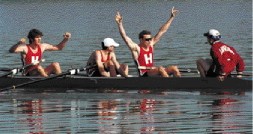The Harvard men's lightweight crew boasts one of the most consistent records of excellence in college sports. Consider the May regatta that climaxes the college rowing season in the East, the Eastern Association of Rowing Colleges (EARC) championships (the "Eastern Sprints"). Since the Sprints began in 1946, the Harvard lights have never failed to make the six-boat grand final, and only once finished lower than fourth (a sixth-place result in 1955). In those 56 years, Harvard lightweights have won the Sprints 24 times; next best is Princeton with 10 victories, followed by Cornell with seven.
 |
| The 2001 lightweight varsity celebrate after beating Yale in Camden, New Jersey, to win the national championship. |
| Photograph by Sports Graphics |
Several years ago, the U.S. Rowing Association designated the Intercollegiate Rowing Association (IRA) regatta, which dates from 1895, as the national collegiate championships. But even before that, a weird pattern set in, starting in 1989. Since then, Harvard has won the national title every odd-numbered year. The seven Crimson championships have been sandwiched around six others for everyone elsethree wins by Princeton, two by Yale, and one by Columbiaall coming in even years.
To win nationals, "You can't just be good," says lightweight oar Jonathan Kibera '98. "You have to be really good and lucky. Because rowing races are decided by tenths of a second." And lightweight races, where all rowers are by definition of similar size and weight, are famous for being tight. "It's lungs, endurance, heart, and a fierce amount of determination," says head lightweight coach Charley Butt. "How do you cope with fatigue? If the crews never give in, it's going to be close."
In 1996, for example, Harvard and Princeton battled stroke for stroke in the final sprint, and in a photo finish, Princeton won by two hundredths of a second, 5:36.20 to 5:36.22. "They were about two inches faster," Butt says. No one has approached those record-breaking times at the IRA since. "Personally, I feel just as proud of them for that race as for any odd-numbered year when we've won," says Butt. "They were fast, cohesive, and they never faltered."
So why the odd-year magic? The simplest hypothesis involves the "hunger" factor. "The guys who just won nationals think they know what to do now," says Kibera, "and they're not quite as nervous as they should be." Lightweight Noah Bloom '01 says, "When you're not number one, there's a lot of drive to win that race." Yet the oarsmen unanimously agree with Butt that from year to year, the crews have been remarkably consistent in their efforts, and hairbreadth finishes like that 1996 final, for example, suggest that none of Harvard's even-year crews has become complacent.
We turned the mystery over to George Polsky '91, a squash player known for his wildly original explanations of events in sport (see "Court Quotester," March-April 1992, page 58). "Streaks like this have been noted only a handful of times in human history," Polsky says, "and each time they have preceded natural or civil disasters. For example, immediately prior to the fall of Rome, Gregorus Homunculus, a little-followed featherweight charioteer, led his division every third season for 21 years. Mere coincidence? I think not.
"Similarly, beginning in 1342, Miles Cavendish, a six-year-old schoolyard scratch marbles player, became legendary not only because he won every fifth game he played over the next seven years, but because his winning streak is now generally believed to have created enormous magnetic turbulence in the solar system, which not only upset the rotation of the earth but indirectly led to the Great Plague of 1349. Thankfully, the Yoda-like guidance of coach Charley Butt can keep the Harvard lightweights aligned with the need for balance in the cosmos. In a nutshell, were it not for him, the long-term consequences of this winning streak might be dire indeed."
Yes, well, of course. But back on terra firma, lightweight oarsman Tim Cullen '96 has a simpler theory that also bears consideration. First, he notes that Harvard crews tend to get continuously faster as spring wears on; Butt is a master at making adjustments that increase boat speed, particularly late in the season when other crews have peaked. Last spring, for example, Harvard lost to Yale at the Sprintsbut, rowing a new shell, came back to win the IRA over the Eli by 0.8 seconds. Since the men's and women's Eastern Sprints alternate their weekends from year to year, in even-numbered years there are two weeks for Butt to tweak his crew before the IRA, while in odd-numbered years he has a three-week window.
Is this the answer to the even-year hex? ¿Quién sabe? Even Cullen admits to being as dumbfounded by the streak as anyone else. However, he adds, "I'd like nothing more than to see it broken this year."
~Craig Lambert





